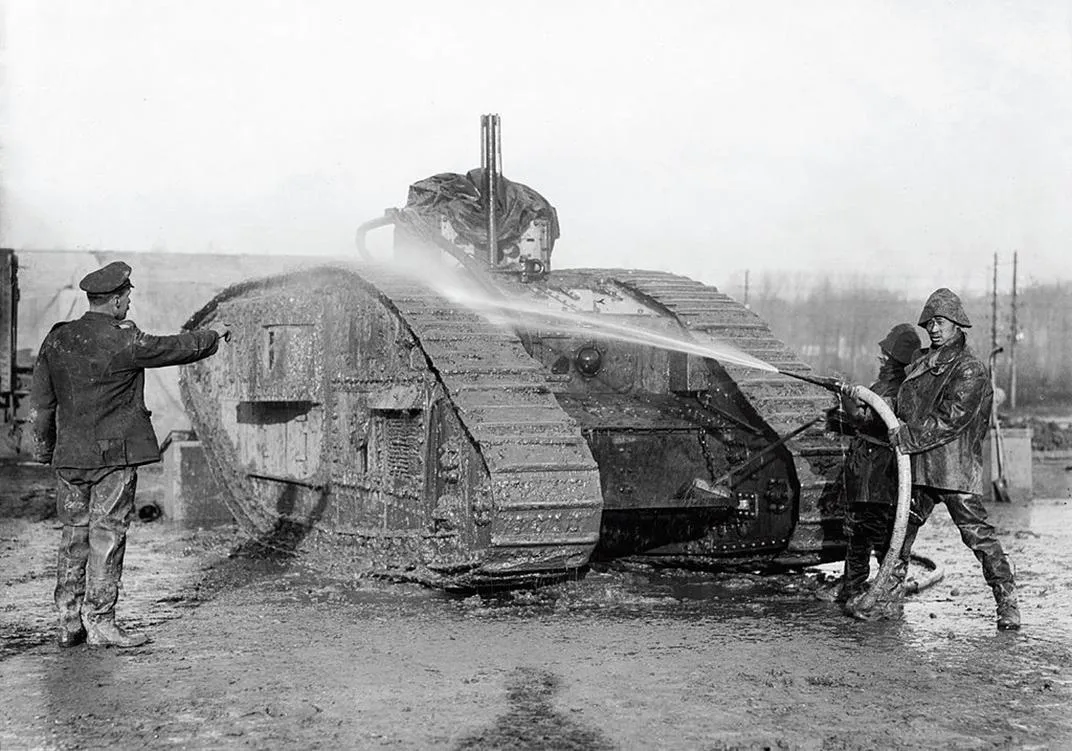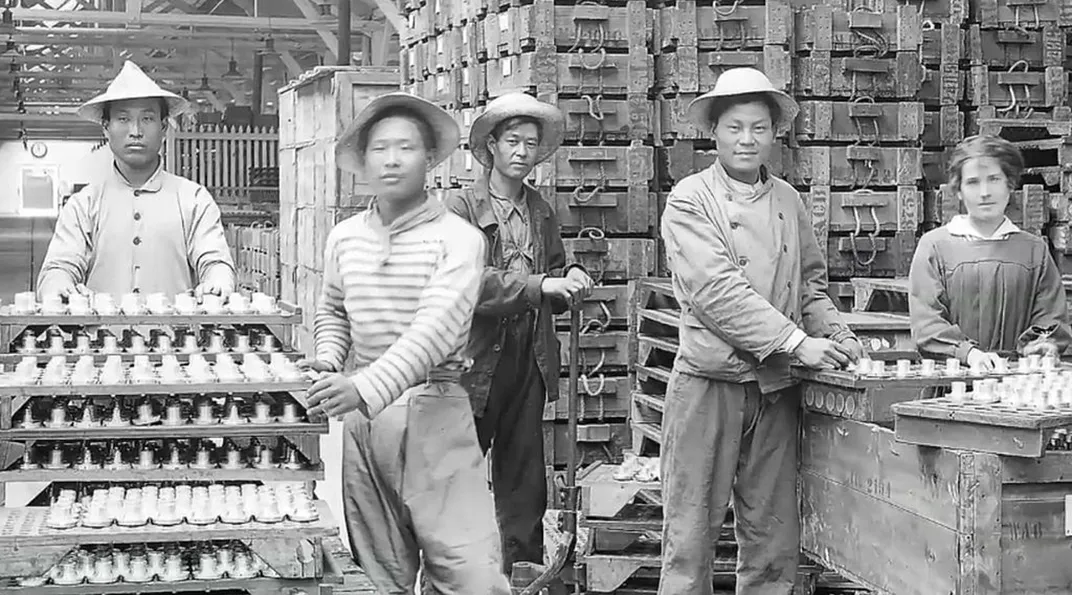The Surprisingly Important Role China Played in WWI
In turn, the peace talks that ended the war had an enormous impact on China’s future
/https://tf-cmsv2-smithsonianmag-media.s3.amazonaws.com/filer/e6/c3/e6c328b6-ab3d-44a9-8d7c-f99898c9ad3f/chinese_workers_wwi_14408620130.jpg)
While the Pacific theater was a major and well-known battleground of World War II, it may come as a surprise that Asian nations played a role in World War I. Both Japan and China actually declared war on Germany in hopes of gaining regional dominance. While China never sent troops into battle, its involvement in World War I was influential—and had impacts that stretched far beyond the war, going on to shape the country's future indelibly.
Under the rule of the Qing Dynasty, China was the most powerful nation in the East for nearly three centuries. But losing the First Sino-Japanese War to Japan in 1895 put an end to that. And the downhill slide didn’t end with losing the war; a subsequent series of treaties divvied up chunks of China between Russia and Japan, a continuation of the creation of European concessions like Hong Kong or the French settlement in Shanghai.
Germany also used military force to insert itself into east Asian affairs. Capitalizing on the murder of two German missionaries, the country attacked and invaded the city of Qingdao in 1897, establishing what amounted to a German colony in Shandong province. The prospect of expelling Germany from the region and taking control themselves was enough to entice Japan to join the fight against Germany, making the Great War a global one in 1914.
Meanwhile in China, a wobbly republican state led by military general Yuan Shikai replaced the imperial system of governance in 1912. But local warlords and clashes with the nationalist party, Kuomintang (led by Sun Yat-sen), continued to threaten his position. “The Chinese people suffered political chaos, economic weakness, and social misery,” writes historian Xu Guoqi in Strangers On the Western Front. “But this was also a period of excitement, hope, high expectations, optimism and new dreams”—because China believed it could use the war as a way to reshape the geopolitical balance of power and attain equality with European nations.
There was only one problem: At first, none of the Allies wanted China to join the fight. Although China declared itself neutral at the start of the war in August 1914, President Shikai had secretly offered British minister John Jordan 50,000 troops to retake Qingdao. Jordan refused the offer, but Japan would soon use its own armed forces to oust the Germans from the city, and remained there throughout the war. By February 1916, with men dying in huge numbers in Europe, Jordan came around to the idea of Chinese aid and told British officials that China could “join with the Entente provided that Japan and the other Allies accepted her as a partner.”
Japan, however, refused to allow Chinese soldiers to fight, hoping to remain the powerhouse in the East.
If China couldn’t fight directly, Shikai’s advisors decided, the next-best option was a secret show of support toward the Allies: they would send voluntary non-combatant workers, largely from Shandong, to embattled Allied countries.
Starting in late 1916, China began shipping out thousands of men to Britain, France and Russia. Those laborers would repair tanks, assemble shells, transport supplies and munitions, and help to literally reshape the war’s battle sites. Since China was officially neutral, commercial businesses were formed to provide the labor, writes Keith Jeffery in 1916: A Global History.

“A lot of those trenches weren’t dug by the [Allied] soldiers, they were dug by Chinese laborers,” says Bruce Elleman, professor of maritime history at the U.S. Naval War College and author of Wilson and China: A Revised History of the Shandong Question. Sending workers—mostly illiterate peasants—was one way for China to prove it deserved a seat at the table whenever the war ended and terms were agreed upon. But even after a year of supplying labor, their contribution remained largely unrecognized diplomatically.
It was more than just prestige that spurred China to enter the conflict: The volatile nation dreamed of regaining complete control of the Shandong province. Located on the eastern shore of China along the Yellow Sea, the region has a rich history as the birthplace of Confucius; diplomat Wellington Koo to call it the “cradle of Chinese civilization.”
In 1915, the year after Japan took Qingdao from Germany, Japan imposed a new treaty on China: The Twenty-One Demands. The highly unpopular treaty required China to cede control of even more territory, including in Shandong and Manchuria. If China participated in World War I, its leaders reasoned, maybe the country could win back this mainland territory.
The United States’ entrance to WWI shifted the political dynamic of the Allies, with U.S. officials supporting China’s cause with an eye toward the war’s end. As Elleman says, “[The U.S. was] hoping at the post-war conference to be able to resolve these diplomatic issues [between China and Japan and Germany],” since President Wilson wanted to take a leadership role in the negotiations and form the League of Nations.
China’s position became more fraught when Germany announced its strategy of unrestricted submarine warfare. More than 500 Chinese laborers aboard the French ship Athos were killed in February 1917 when a U-boat struck the ship. Finally, encouraged by the U.S. and believing it was the only sure way to be considered in the eventual peace agreements, China declared war on Germany on August 14, 1917—though little changed in the support they provided, since they had already been sending laborers.
By the end of the war, Chinese workers would rank as the largest and longest-serving non-European contingent in World War I. France recruited 37,000 Chinese workers, while the United Kingdom took in 94,500. The men sent abroad would earn an estimated total of $2.2 billion, reports the South China Morning Post. Along the way, so many of these workers died or sustained injuries that China established a Bureau of Overseas Chinese Workers and convinced the U.K. to provide compensation for the wounded men.

“China had prepared to attend the post-war peace conference as early as 1915,” says Xu. When the war at last ended in November 1918, China planned its delegation for the Paris Peace Conference, hoping to finally achieve full control of its mainland territory.
But China was given only two seats at the Paris Peace Conference to Japan’s five, since the latter had contributed combat troops. Matters only devolved from there. Some of the European delegates were unfamiliar with the Twenty-One Demands, writes Julian Theseira in Global Histories, and the Western powers ultimately awarded Shandong to Japan; the Western diplomats believed they should honor the treaty Japan pressured China to sign after taking Shandong. China saw the move as a rejection of its demand to be recognized as an equal player in global politics, and as an affront to its sovereignty.
“China was deeply angry at the Versailles Treaty and was the only country at the postwar peace conference to refuse to put a signature on it,” Xu said. A student-led protest in Beijing called the May Fourth Movement was organized in response to outrage over the peace talks. It called for political and social changes and, as Xu writes, was a sign of China’s turn towards socialism in 1921 with the foundation of the Chinese Communist Party.
Elleman goes even further in stating the importance of the Shandong issue. “They talk about these forks in the road, and this is one. If this whole Shandong controversy had not happened, China might never have become Communist,” Elleman says. He argues that leaving the Shandong question unresolved, at least in China’s eyes, meant they mistrusted European governments going forward and felt more attracted to socialism. “It’s one of the most important pieces in modern Chinese history.”
/https://tf-cmsv2-smithsonianmag-media.s3.amazonaws.com/accounts/headshot/lorraine.png)
/https://tf-cmsv2-smithsonianmag-media.s3.amazonaws.com/accounts/headshot/lorraine.png)